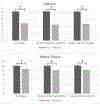Functional and Cognitive Decline Among Older Adults After High-risk Surgery
- PMID: 32404660
- PMCID: PMC8060894
- DOI: 10.1097/SLA.0000000000003950
Functional and Cognitive Decline Among Older Adults After High-risk Surgery
Abstract
Objective: The aim of this study was to determine whether older adults are at higher risk of lasting functional and cognitive decline after surgery, and the impact of decline on survival and healthcare use.
Summary background data: Patient-centered outcomes after surgery are poorly characterized.
Methods: Using data from the Health and Retirement Study linked with Medicare, we matched older adults (≥65 years) who underwent one of 163 high-risk elective operations (ie, inpatient mortality of ≥1%) with nonsurgical controls between 1992 and 2012. Functional decline was defined as an increase in the number of activities of daily living (ADLs) and/or instrumental activities of daily living (IADLs) requiring assistance from baseline. Cognitive decline was defined by worse response to a test of memory and mental processing from baseline. Using logistic regression, we examined whether surgery was associated with functional and cognitive decline, and whether declines were associated with poorer survival and increased healthcare use.
Results: The matched cohort of patients who did not undergo surgery consisted of 3591 (75%) participants compared to 1197 (25%) who underwent surgery. Patients who underwent surgery were at higher risk of functional and cognitive declines [adjusted odds ratio (aOR) 1.52, 95% confidence interval (CI): 1.23-1.87 and aOR 1.32, 95% CI: 1.03-1.71]. Declines were associated with poorer long-term survival [hazard ratio (HR) 1.67, 95% CI: 1.43-1.94 and HR 1.35, 95% CI: 1.15-1.58], and were significantly associated with nearly all measures of increased healthcare utilization (P < 0.001).
Conclusion: Older adults undergoing high-risk surgery are at increased risk of developing lasting functional and cognitive declines.
Copyright © 2020 Wolters Kluwer Health, Inc. All rights reserved.
Conflict of interest statement
The authors report no conflicts of interest.
Figures



References
-
- Ortman JM VV, Hogan H. An aging nation: the older population in the United States. United States Census Bureau. Published 2014. Accessed January 4, 2016.
-
- Ghignone F, van Leeuwen BL, Montroni I, et al. The assessment and management of older cancer patients: A SIOG surgical task force survey on surgeons’ attitudes. Eur J Surg Oncol. 2015. - PubMed
-
- Finlayson EV, Birkmeyer JD. Operative mortality with elective surgery in older adults. Eff Clin Pract. 2001;4(4):172–177. - PubMed
-
- Turrentine FE, Wang H, Simpson VB, Jones RS. Surgical risk factors, morbidity, and mortality in elderly patients. J Am Coll Surg. 2006;203(6):865–877. - PubMed
-
- American College of Surgeons GSVQIP. Optimal Resources for Geriatric Surgery. In. Chicago, IL: 2019.
Publication types
MeSH terms
Grants and funding
LinkOut - more resources
Full Text Sources
Medical

